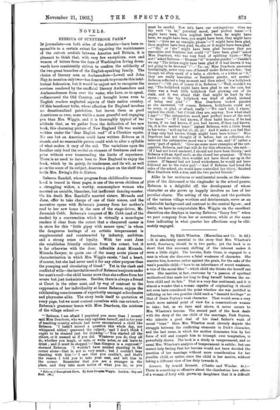Sanctuary. By Edith Wharton. (Macmillan and Co. 35. 6d.) —It
is absolutely essential to the story that Mrs. Wharton's novel, Sanctuary, should be in two parts ; yet the book is so short that this necessary shifting of the interest makes it seem a little slight. The heroine, Bate Orme, is engaged to a man in whom she discovers a fatal weakness of character. She marries him, however, rather against the grain, for the sake of the man's possible child—" born to an inheritance of secret weakness, a vice of the moral fibre "—which child she thinks she herself can save. She marries, in fact, overcome by "a passion of spiritual motherhood that made her long to fling herself between the un- born child and its fate." That is a very fine sentiment, and it is almost a wonder that a woman capable of originating it should not even have considered the point whether she was justified in inflicting on her own possible child such a "damned heritage" as that of Denis Peyton's weak character. That would seem a very much more natural point of view for a conscientious woman to take; but, as we have said above, it never occurs to Mrs. Wharton's heroine. The second part of the book deals with the story of the one child of the marriage, Dick Peyton, who inherits a good deal of his dead father's want of moral "tone." Here Mrs. Wharton most cleverly depicts the struggle between the conflicting elements in Dick's character, and the last scene, in which his mother dominates him by her force of will and compels him to triumph over temptation, is powerfully drawn. The book is a study in temperament, and as usual Mrs. Wharton's analysis of temperament is subtle; but one cannot help feeling that her heroine would not have decided the question of her marriage without more consideration for her possible child, or rather, since the child is her motive, without taking a different view of her duty towards it.


























































 Previous page
Previous page